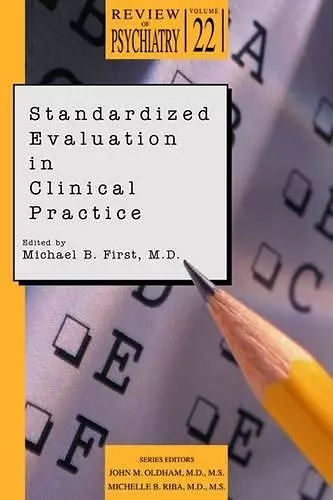Standardized Evaluation in Clinical Practice
Michael B First editor John M Oldham editor Michelle B Riba editor
Format:Paperback
Publisher:American Psychiatric Association Publishing
Published:3rd Jun '03
Currently unavailable, and unfortunately no date known when it will be back

In clinical settings clinicians continue to underutilize interviews and rating scales because their benefits are underappreciated and their use is perceived as too costly and time consuming. Augmenting the broad information contained in the APA's Handbook of Psychiatric Measures, this in-depth guide examines the real-world issues involved in implementing measures in actual clinical settings. This book
• Asserts that the use of structured diagnostic interviews in clinical settings is justified, suggesting that it would be most cost-effective to target research assessment toward those groups most difficult to evaluate and most likely to be misdiagnosed, especially those whose misdiagnosis leads to consumption of a greater-than-expected amount of treatment resources
• Focuses on the underrecognition and underreporting of diagnostic comorbidity, discussing the daunting practical issues of using comprehensive structured interviews and suggesting instead that a self-administered questionnaire be used to screen for the most common DSM-IV Axis I disorders
• Considers the use of structured interviews-administered by either lay interviewers or by computer-in the diagnostic assessment of children and adolescents, making a case that using the research model (i.e., reliable measures that can be given to large numbers of subjects) in clinical settings meets the cost-efficiency requirements of understaffed clinical providers
• Discusses the utility and limitations of research instruments for crucially important clinical purposes-determining suicide risk-and presents the inherent difficulties in predicting risk and explore the underlying clinical risk factors based on their proposed stress-diathesis model
• Presents the issues and challenges involved in the U.S. Department of Veteran's Affairs (VA) attempt to implement a national program requiring the routine use of the GAF scale. The authors conclude with a discussion of the reasons why the Global Assessment of Functioning (GAF) scale was chosen, software and procedures, methods to ensure system compliance, and the specific measures taken by two VA networks that helped improve its implementation
It is a groundbreaking guide that details the pros and cons of using structured interviews and rating scales in clinical settings to ensure reliable and valid assessment of diagnoses, symptoms, and outcomes.
This volume, particularly the first chapter written by Monica Ramirez Bosco Ph.D., does an excellent job of outlining the current problems with misdiagnosis in clinical tools. Overall, this is an excellent resource for clinicians.
-- Michael Purcell, MA * Doody's Book Reviews *This book is a valuable resource and is recommended to those who want/need to know more about standardized evaluation in clinical psychiatry.
-- Saxby Pridmore, M.D. * The American Journal of PsychiatISBN: 9781585621149
Dimensions: 229mm x 152mm x 13mm
Weight: 322g
192 pages